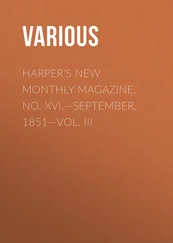Various - Harper's New Monthly Magazine, No. XXIV, May 1852, Vol. IV
Здесь есть возможность читать онлайн «Various - Harper's New Monthly Magazine, No. XXIV, May 1852, Vol. IV» — ознакомительный отрывок электронной книги совершенно бесплатно, а после прочтения отрывка купить полную версию. В некоторых случаях можно слушать аудио, скачать через торрент в формате fb2 и присутствует краткое содержание. Издательство: Иностранный паблик, Жанр: periodic, foreign_edu, на английском языке. Описание произведения, (предисловие) а так же отзывы посетителей доступны на портале библиотеки ЛибКат.
- Название:Harper's New Monthly Magazine, No. XXIV, May 1852, Vol. IV
- Автор:
- Издательство:Иностранный паблик
- Жанр:
- Год:неизвестен
- ISBN:нет данных
- Рейтинг книги:4 / 5. Голосов: 1
-
Избранное:Добавить в избранное
- Отзывы:
-
Ваша оценка:
- 80
- 1
- 2
- 3
- 4
- 5
Harper's New Monthly Magazine, No. XXIV, May 1852, Vol. IV: краткое содержание, описание и аннотация
Предлагаем к чтению аннотацию, описание, краткое содержание или предисловие (зависит от того, что написал сам автор книги «Harper's New Monthly Magazine, No. XXIV, May 1852, Vol. IV»). Если вы не нашли необходимую информацию о книге — напишите в комментариях, мы постараемся отыскать её.
Harper's New Monthly Magazine, No. XXIV, May 1852, Vol. IV — читать онлайн ознакомительный отрывок
Ниже представлен текст книги, разбитый по страницам. Система сохранения места последней прочитанной страницы, позволяет с удобством читать онлайн бесплатно книгу «Harper's New Monthly Magazine, No. XXIV, May 1852, Vol. IV», без необходимости каждый раз заново искать на чём Вы остановились. Поставьте закладку, и сможете в любой момент перейти на страницу, на которой закончили чтение.
Интервал:
Закладка:
The dream passes as the day dies, and to the same stars which heard your morning shout of desert praise, you whisper as you close the tent-door at evening,
"Better fifty years of Europe, than a cycle of Cathay."
MOHAMMAD ALEE
I do not wonder that Mohammad Alee burned to be master of Syria, and struck so bravely for it.
His career was necessarily but a brilliant bubble, and his success purely personal. That career was passed before the West fairly understood it. It was easier for the Jews to believe good from Nazareth than for us to credit genius in Egypt, and we should as soon have dreamed of old mummied Cheops throned upon the great pyramid and ruling the Pharaohs' realm anew, as of a modern king there, of kingliness unsurpassed in the century, except by Napoleon, working at every disadvantage, yet achieving incredible results.
He was the son of a fisherman – made his way by military skill – recognized the inherent instability of the Mameluke government then absolute in Egypt, and which was only a witless tyranny, sure to fall before ambitious sense and skill. He propitiated the Sublime Porte, whose Viceroy in Egypt was only a puppet of state, practically imprisoned by the Mamelukes in the citadel – and he gained brilliant victories in the Hedjaz, over the Wahabys, infidel and schismatic Muslim.
In 1811, he accomplished the famous massacre of the Mamelukes in the court of the citadel, of which Horace Vernet has painted so characteristic a picture, and for which Mohammad Alee has been much execrated.
But in Turkish politics, humanity is only a question of degree. With Mohammad Alee and the Mamelukes it was diamond cut diamond. They were a congregation of pestilent vapors, a nest of hoary-headed tyrants, whom it was a satisfaction to Humanity and Decency to smoke out and suffocate in any way. Mohammad Alee had doubtless little enough rose-water in his policy to satisfy the grimmest Carlyle. The leader of sanguinary Albanians and imbruted Egyptians against wild Arab hordes is not likely to be of a delicate stomach.
But he was clear-eyed and large-minded. He had the genius of a statesman rather than the shrewdness of a general, although as a soldier he was singularly brave and successful. Of all his acts the massacre of the Mamelukes was perhaps the least bloody, because, by crushing the few heads he had won the victory. A sudden and well-advised bloodshed is often sure to issue in a peace which saves greater misery. It was Cromwell's rule and it was Napoleon's – it was also Mohammad Alee's, and the results usually proved its wisdom.
Moreover, in the matter of this massacre, the balance of sympathy is restored by the fact that only a short time previous to the Mamelukes' Banquet of Death in the citadel, they had arranged Mohammad Alee's assassination upon his leaving Suez. By superior cunning he ascertained the details of this pleasant plan, and publicly ordered his departure for the following morning, but privately departed upon a swift-trotting dromedary in the evening. There was great consequent frustration of plan and confusion of soul among the Mamelukes, who had thought, in this ingenious manner, to cut the knot of difficulty, and they were only too glad to hurry with smooth faces to the Pacha's festival – too much in a hurry, indeed, to reflect upon his superior cunning and to be afraid of it. They lost the game. They were the diamond cut, and evidently deserve no melodious tear.
Mohammad Alee thus sat as securely in his seat as a Turkish Pacha can ever hope to sit. He assisted the Porte in the Greek troubles, perpetrating other massacres there; and afterward, when Abdallah, Pacha of Acre, rebelled against "the Shadow," Mohammad Alee was sent to subdue him. He did so, and then interceded with the Porte for Abdallah's safety.
Meanwhile, Mohammad Alee had ascertained his force, and was already sure of the genius to direct it. He had turned the streams of French and English skill into the agriculture, manufactures, and military discipline of Egypt. His great aim for years had been to make Egypt independent – to revive the ancient richness of the Nile valley, and to take a place for Egypt among the markets of the world. He accomplished this so far, that, restoring to the plain of Thebes the indigo which was once famous there, he poured into the European market so much and so good indigo that the market was sensibly affected. His internal policy was wrong, but we can not here consider it.
Watching and waiting, in the midst of this internal prosperity and foreign success and amazement, while Egyptian youth were thronging to the Parisian Universities, and the Parisian youth looked to Egypt as the career of fame and fortune – as the young Spaniards of a certain period looked to the diamond-dusted Americas – in the midst of all the web Mohammad Alee sat nursing his ambition and biding his time.
Across the intervening desert, Syria wooed him to take her for his slave. Who was there to make him afraid? Leaning on Lebanon, and laving her beautiful feet in the sea, she fascinated him with love. He should taste boundless sway. Eastward lay Bagdad and Persia, thrones of Caliphs who once sat in his seat – why should not he sit in theirs? Then with softer whispers she pointed to the Golden Horn and the Bosphorus, and looked what she dared not speak.
I do not wonder that he was enchanted. I do not wonder that he burned to be master of the superb slave that lay so lovely and fair in the sun, dreaming, as now we see her dream, under the vines and olives. His peer, Napoleon Bonaparte, against whom, in Egypt, his maiden sword was fleshed, whom he loved to name and to hear that they were born in the same year, had thus seen from Elba the gorgeous Fata-Morgana of European empire. How could Mohammad Alee reflect that sallying forth to grasp it, that peer had bitten the dust? That fate deterred the Pacha, as the experience of others always deters ourselves – as a blade of grass stays the wind. Shall not you and I, my reader, swim to our Heros, though a thousand Leanders never came to shore?
It was this Syria through which we plod, this brilliant morning, that seduced Mohammad Alee.
A land of glorious resources and without a population. Here grow wheat, rye, barley, beans and the cotton plant. Oats are rare; but Palestine produces sesame and dourra, a kind of pulse like lentils. Baalbec grows maize. Sugar and rice are not unknown at Beyrout. Lebanon is wreathed with vines. Indigo flourishes without cultivation on the banks of the Jordan. The Druses cultivate the white mulberry. Gaza has dates like those of Mecca, and pomegranates as fine as those of Algiers. Figs and bananas make the gardens of Antioch tropical. From Aleppo come pistachio-nuts. The almond, the olive and the orange thrive in the kindly air; and Damascus revels in twenty kinds of apricot, with all the best fruits of France.
Many of the inhabitants pass us, and we can see what they are. They are repulsive in appearance, the dregs of refuse races. They look mean and treacherous, and would offer small resistance to determination and skill. Mohammad Alee had little fear of the Syrians.
He could not resist the song of the Siren; and suddenly "the Eastern Question" agitated political Europe, and the diplomatic genius of the three greatest states – England, France and Russia – was abruptly challenged by the alarming aspect of the Syrian war, which threatened, with a leader despising the political stagnation and military imbecility of the vast realm of "the Shadow of God on Earth," to issue in a new empire.
Mohammad Alee having subdued Abdallah, Pacha of Acre, and saved his life and throne by intercession with the Porte, was surprised that Abdallah harbored all fugitives from Egypt. He observed that, following his own example, Abdallah was introducing the European discipline into his army, and was enticing into his service many young officers who had been Europeanly instructed at his own expense. He expostulated with Abdallah, and appealed to the Porte. The Sublime Porte, like other political Sublimities, hesitated, meditated —
Читать дальшеИнтервал:
Закладка:
Похожие книги на «Harper's New Monthly Magazine, No. XXIV, May 1852, Vol. IV»
Представляем Вашему вниманию похожие книги на «Harper's New Monthly Magazine, No. XXIV, May 1852, Vol. IV» списком для выбора. Мы отобрали схожую по названию и смыслу литературу в надежде предоставить читателям больше вариантов отыскать новые, интересные, ещё непрочитанные произведения.
Обсуждение, отзывы о книге «Harper's New Monthly Magazine, No. XXIV, May 1852, Vol. IV» и просто собственные мнения читателей. Оставьте ваши комментарии, напишите, что Вы думаете о произведении, его смысле или главных героях. Укажите что конкретно понравилось, а что нет, и почему Вы так считаете.












